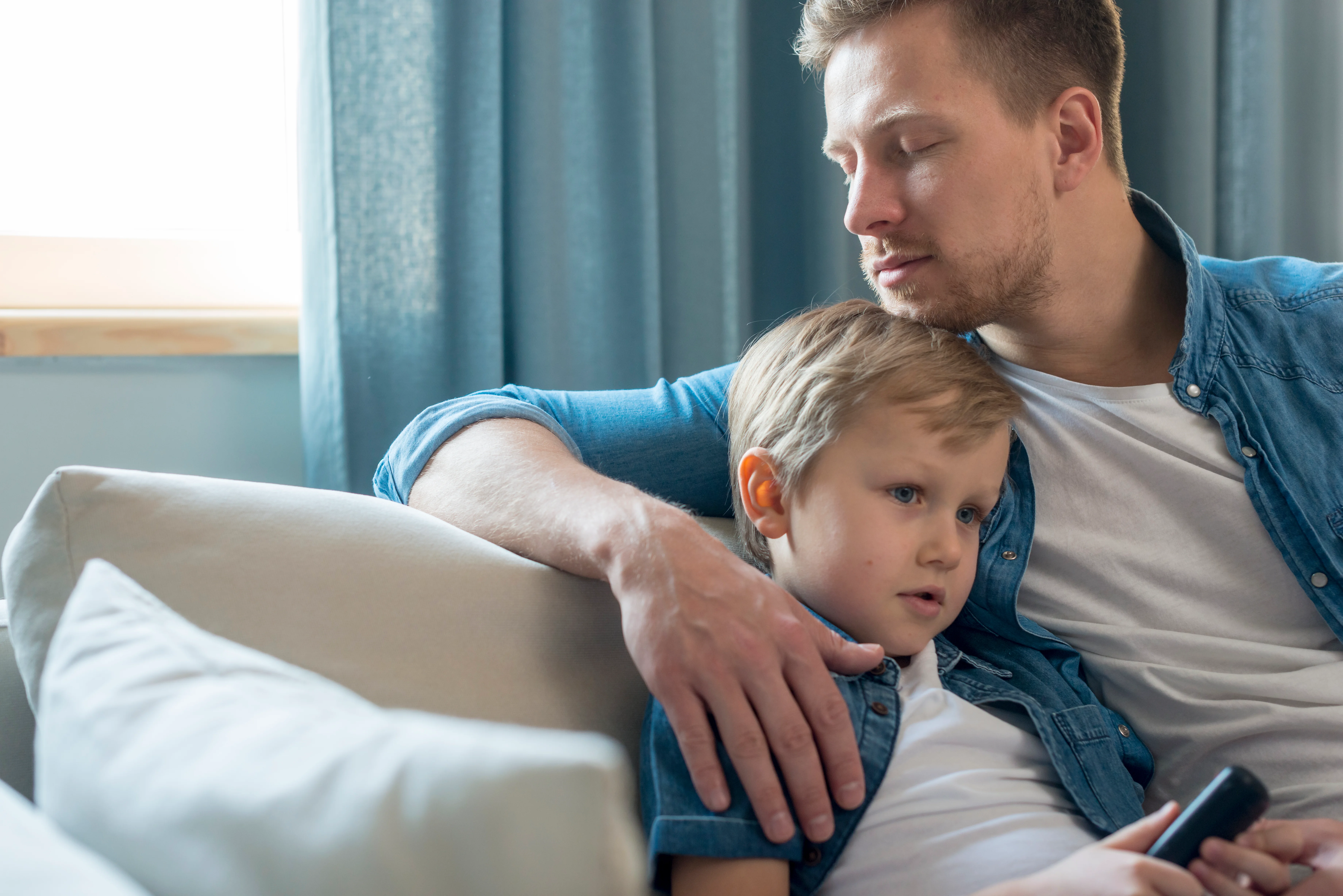.webp)


Behind closed doors, many parents are quietly navigating an overwhelming blend of responsibility, pressure, and self-doubt. In the U.S., especially, where societal expectations are high and support systems are often limited, the emotional weight of maintaining a secure family life can quietly erode mental well-being.
Mental health must be the primary concern for parents; this parenting advice is simply foundational. When stress becomes chronic and support is lacking, it affects not only a parent’s ability to cope but also the emotional environment in which children grow.
This blog examines what the data shows about parenting stress, the availability (or absence) of support, and how these factors intersect with mental health.

Many parents underestimate the emotional, mental, and physical demands of raising children, especially in today’s fast-paced world. The lack of social support, stagnating family income, rising living costs, and increased societal expectations (such as the pressure to be emotionally available while maintaining a career) may explain why parenting feels harder than anticipated.
.webp)
This may reflect rising anxiety around safety, exposure to harmful online content, or fear of judgment, especially for very young children. Cultural messages often pressure mothers to be ever-present and vigilant, which may contribute to overprotective behavior.
This could stem from emotional exhaustion, time constraints, or uncertainty about how to enforce boundaries. In some cases, parents may give in to avoid conflict or guilt, especially when they feel overstretched or unsupported.

Despite the stress, many parents still feel confident in their role, perhaps because they are doing their best within difficult circumstances. This may also reflect the value parents place on being present, loving, and involved, even if perfection isn’t possible.
Financial pressure, housing costs, and lack of childcare options have led many young parents to live in multigenerational households. While this can offer support, it may also introduce complexity in roles and parenting styles.
.webp)
Across nearly all age groups above toddlerhood, the internet consistently ranks as a leading worry. For most parents of children ages 7 to 15, it becomes the primary concern, surpassing fears related to physical safety or social development. The usual safety measures are parental controls, parent's knowledge of what sites their children visits and educating them.
This reflects anxiety around online predators, inappropriate content, and cyberbullying during critical developmental years.
Concerns about bullying begin to appear around preschool age (around 4 years old) and continue through adolescence. However, they peak during elementary school, when 69% of parents report bullying as a top issue. This is likely tied to the increased social interaction in a child's school and group dynamics that emerge in early schooling.
For children under age 6, especially ages 0–3, the top parental fear is harm from strangers. While this concern declines slightly as children grow, it remains in the top five for kids aged 7 to 12, highlighting the lingering anxiety around public safety and trust.
However, parents generally allow sleepovers with their child's friends when their child is around 10 years old. This is highly dependent on the child's ability to be independent.
Among parents of teenagers, driving safety becomes a primary concern, slightly outranking fears around sexual activity. This prioritization aligns with data showing that adolescent children have the highest accident rates of any age group, making driving a tangible, immediate safety issue for families.

Nearly a third of U.S. parents tend to feel overwhelmed by the demands of parenthood. Mothers more commonly report this stress than fathers.
The constant balancing act between work, household duties, and parenting—with minimal downtime—creates chronic stress. Many parents also face a lack of affordable childcare and limited family or community support, making it harder to manage day-to-day responsibilities.
.webp)
A significant number of parents, especially those with young children, report that parenting is physically and mentally draining.
Parenting infants and toddlers involves constant attention, disrupted sleep, and a need for near-constant emotional regulation. For parents who work full-time, the fatigue is compounded by having little time to rest or recharge.
About half of all parents are deeply concerned about their children’s emotional well-being, with some variations in concern based on race and ethnicity.
Increased awareness of youth mental health issues, rising suicide rates, and the emotional effects of social media and academic pressures have made many parents hyper-aware—and often anxious—about their children’s mental health trajectories.
More than half of mothers report being extremely worried about the emotional and psychological health of their teenagers.
Adolescence is a time of emotional volatility, peer pressure, and identity development. The added impact of digital exposure, cyberbullying, and the lingering effects of the pandemic have intensified mental health concerns among teens, and thus among their mothers.
Roughly one in seven new mothers experiences postpartum depression (PPD) within the first few weeks after childbirth.
Hormonal changes, physical exhaustion, and abrupt lifestyle transitions can make mothers especially vulnerable during this period. Lack of emotional support, financial stress, and societal stigma often prevent timely diagnosis or treatment.
Fathers, too, are affected after childbirth; about 1 in 7 experience depression within the first year.
Though less discussed, fathers' involvement in child-raising creates emotional and identity shifts. The pressure to financially provide, be emotionally present, and support their partner, without much societal validation, can lead to depressive symptoms.
Nearly 3 in 10 single mothers experience significant psychological distress while caring for their children, compared to partnered mothers, who experience similar distress about half as often.
Single mothers often juggle multiple roles, be it breadwinner, caregiver, and emotional anchor, with little backup. Financial instability, loneliness, and lack of access to mental health care all contribute to heightened emotional strain.
Parenting today is uniquely challenging due to a combination of social, economic, and cultural factors. Many parents juggle demanding work schedules, rising living costs, and limited access to affordable childcare.
Constant social media comparisons, conversations with friends, family members, and other parents will make parents say they feel judged on their ability as parents. This pressure to parent “perfectly” has added new layers of stress. In addition, community and extended family support, once a cornerstone of child-rearing, has become less accessible, leaving many parents to navigate it all alone.
The vast majority of parents struggle with exhaustion, time management, financial stress, and the mental toll of being constantly needed. Emotionally, many wrestle with guilt, decision fatigue, and fear of making mistakes. Not to mention the differences of struggle between a step-parent and a biological parent.
In the U.S., a significant number of parents also report feeling isolated or unsupported, particularly those raising children without strong social or family networks.
Gentle parenting has gained popularity, particularly in recent years. While exact adoption rates vary, surveys indicate that approximately one in three parents in the U.S. are actively seeking to adopt gentle or responsive parenting strategies.
Social media trends have helped raise awareness, but studies also show that many parents struggle to maintain these methods consistently due to stress, lack of support, or behavioral challenges in children.
Parenting plays a central role in a child’s emotional, cognitive, and social development. Warm, responsive parenting tends to promote secure attachment, emotional regulation, and better academic and social outcomes.
Conversely, chronic stress, inconsistent caregiving, or harsh discipline can negatively impact a child’s brain development, self-esteem, and long-term mental health.
Child development experts see authoritative parenting, characterized by warmth, clear boundaries, and responsiveness, as the most effective and encouraging. Research consistently links this parental involvement to positive outcomes in children, including higher self-esteem, better emotional regulation, and stronger academic performance.
It strikes a balance between support and structure, helping children feel both safe and capable.
While difficulty varies by family, many parents report children younger than 3 years and adolescence (ages 12–18) as the most challenging phases. Infancy brings physical exhaustion and identity shifts, while adolescence introduces emotional distance, boundary-testing, and complex mental health dynamics.
Both developmental milestones demand intense emotional presence, adaptability, and support, making them especially taxing without adequate resources or rest.
Parenting is one of life’s most meaningful roles, but as the data shows, it also comes with significant emotional and psychological weight. From chronic stress and fatigue to fears about children’s well-being, today’s parents are navigating unprecedented pressures of healthy development with limited support.
While many continue to show resilience and dedication, these challenges should not be faced in silence or isolation.
If you’ve found yourself overwhelmed, exhausted, or questioning your own well-being as a parent, know that you are not alone, and more importantly, that support is available. Speak with a mental health professional who offers clarity, tools, and a sense of relief in ways that self-help alone often cannot.
Talk with us and take the first step toward a healthier parenting journey.
Sources: